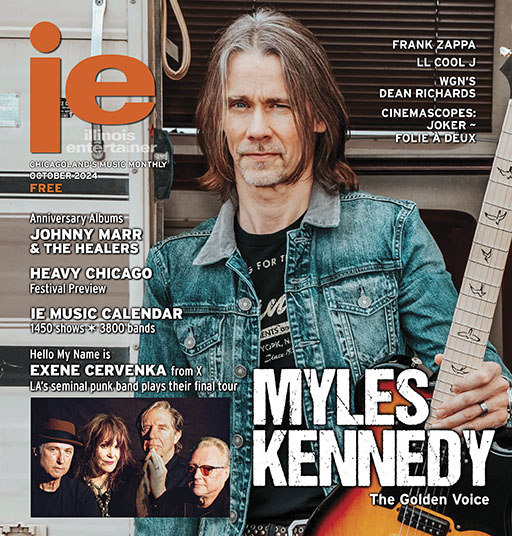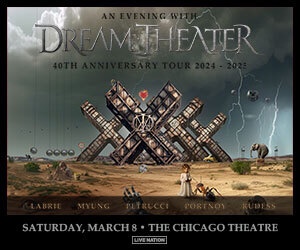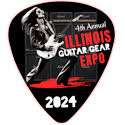Cover Story: Rise Against
Target Market

To just about any music fan, Rise Against would be hard to ignore. Arlington Heights-raised Tim McIlrath sings as if his skin is on fire, while his bandmates push relentlessly behind him and pause only to rally behind a new anthemic phrase. About 10 years ago, Rise Against covered Journey’s “Any Way You Want It” by ripping off the training wheels and slashing the remaining tires in order to ride on the rims. Had Steve Perry howled the original version like McIlrath, his label would have hospitalized him. The band’s left-leaning lyrics and Molotov-cocktail soundtrack portended a life sweating it out in clubs and growing to cult status.
Not that McIlrath sees it that way.
Appearing: May 13th and 14th at Aragon Ballroom in Chicago
“I feel like if we hadn’t gotten bigger or if we’d even gotten smaller, we’d be preaching to the converted,” he says. “I’d be playing a show somewhere and people would be like, ‘Oh, here’s Rise Against. They’re against the war – big fucking surprise.'”
As Geffen Records readies their sixth album, Endgame, Rise Against are ready to wear out a lot more people. Fundamentalist punks may have blacklisted them for chasing success on a big label, but McIlrath argues that earning a new audience to holler at was the only way to save the band. While their popularity still gets derided as “selling out,” cynics rarely consider the attendant challenges. Surely, spoils have come in the form of relaxed recording budgets, touring comforts, and reasonable financial security. But “preaching to the converted” goes out the window when you play Phoenix or Omaha on a Tuesday night.
“I see it as a challenge,” McIlrath insists, “and I take that challenge on. In a sense, it’s given new life to the band. It riles the audience; it ruffles feathers. I have to be an optimist! I’ve gotta have hope for the next generation, or, really, my generation.”
Those sound like funny words from someone whose latest work is called Endgame. The scorching, 12-song set posits a cultural apocalypse – through financial, environmental, or other disaster – compounded by centuries of greed, sloth, and wastefulness. On the surface it sounds like a generic, extreme-leftist fantasy, based on reams of anti-materialistic screeds and remedial Marxism. The kicker is the optimism, however.
“Talking about the world’s problems isn’t new territory for Rise Against,” he ribs. “I was trying to approach a lot of the stuff from a different angle. If you’re a band that talks about the tumultuous times we live in, how do you take a new look at the same problems we’re still living? How do you write a new song against the war when there’s been a war for 10 years? What can I add that hasn’t already been said, not only by bands, but activists and speakers? Endgame was taking a look at the times we live in and instead of chipping away at the different problems it was looking at it from a point of view of ‘the consequences have already happened,’ and what would that world look like. I think it was a subconscious strategy to paint the world after some kind of collapse to sort of get people thinking about what we’re dealing with right now.”
For McIlrath, guitarist Zach Blair, bassist Joe Principe, and drummer Brandon Barnes, it isn’t a matter of exacting a pose they’d picked up from bands they idolized in the ’90s hardcore movement. While anyone with a television could rail against the powers that be, McIlrath spent some time in New Orleans to have a more tangible grip on how broken the system is – and he went pre-BP oil disaster. His disbelief stemmed not from partisan outrage – storms happen everywhere, all the time – but the agonizing pace of the recovery.
“Rise Against has toured there a couple times, but the nature of touring is you’re trying to get to and from the next place as fast as you can,” he explains, having finally spent time there on an activist’s fact-finding mission. “It was poverty unlike anything I’d ever seen in America, and the kind of poverty I’d only seen in my travels through Mexico or Southeast Asia. It was alarming for me – as it has been for many people – to see that this exists within the borders of America, one of the most powerful and wealthy countries in the world. To see that kind of thing happening in your own backyard and see it still happening with the recovery not being a complete process?”
Even with his anger, McIlrath had to table his emotions and dig for what he could bring to the table. The public understands the extent of the tragedy, but also feels exhausted from caring for it. He chose not to pitch a new America as some utopian dream, but underscore how everyone’s choices (or indifference) affect the future.
“I don’t want to present it as ‘there is a utopia,'” he says. “I do think that civilization as we know it today is not something that doesn’t deserve to exist. But what if what we’ve created is some kind of unsustainable model that, if it does collapse, is because it was supposed to? It could not be propped up anymore? The record takes the point of the view of, ‘what if what’s on the other side of this is better?’ We think about the apocalypse as doom and gloom. I don’t mean ‘better’ as this perfect place, but something where people don’t live on the backs of others, and life isn’t about fucking other people over to survive.”
Selling this to a fanbase addicted to the violence inherent in Rise Against’s musical accompaniments came into play as well.
“On paper,” he explains, “Rise Against being an anti-war band who believe in social justice sort of paints us as hippies. And the world has this stereotype of the hippie waving the peace sign, handing out pamphlets, and playing ‘Kumbaya.’ So I love that Rise Against takes from that frame of mind, but juxtaposes it with aggressive, intense music. And I love that music is our medium. We’re not walking around asking to sign a petition; we’re screaming a statement. I think that’s where hardcore [punk] was born. I love that mix of the two worlds. We are talking about peace and taking care of one another, and doing it in a musical format where no one was doing it – putting a new face on activism.”
Interrupting the lives of middle-Americans to peddle political activism certainly requires incentives. New listeners are bound to be put off by Rise Against’s pleas for understanding and harmony, just as McIlrath is bound to find new fans more interested in punctuated screaming than what’s being screamed. Sometimes it’s like screaming at a wall.
“There are times I’ll meet a kid after or before a show,” he says, “some giant dude who just scares the hell out of me, and I’ll think, ‘This is the kind of kid who beat me up in high school. How did you find your way here?’ And he’s probably beating up the equivalent of me at his high school right now. Years ago, we were opening for Strung Out at a club in Orlando, and I was shaking hands with some people and one kid was like, ‘That show was awesome! I loved it! I was in the pit and just punching people all night.’ I said to him, ‘I’m glad you’re here, but you really shouldn’t punch people in the pit.’ And he goes, ‘Oh, nah. It was cool. They were all faggots!’ I didn’t know what to say. It was just one of those moments where you realize that when you put your music out there, you have no control over it. And that could be depressing if you let it. Like, ‘I don’t like this audience and I don’t want these people listening to my music.’ But it can be something that can be hopeful in the sense of what if your music is putting water where the fire is? Maybe it’s something this kid should hear. What if someday it seeps in and makes sense or reads this interview and gets a better idea of where Rise Against is coming from? Maybe have the music be the gateway drug and if he stays he finds this community of acceptance.”
Falling forward through music is a common experience. McIlrath knows the feeling, having been weaned in the ideological battlegrounds of the Northwest suburbs, where the incorrect Christmas-light display could land you on the wrong side of the city council.
“I went to a Catholic school and we were sheltered from a lot of music that was out there,” he says. “I had older sisters who were into hair metal, and that was the first music I started hearing. But I gravitated toward some of the heavier stuff like Metallica, Slayer, and Pantera. When I found that, it opened my ears to music I wasn’t hearing on the radio. I remember my friends and I in junior high – there was that radio station [W]VVX, and it was way at the end of the dial and it would be metal all the time. So we’d tune in late at night, and back then if you had a boombox with a cassette player, you would just tape the radio. So we would record an hour and those were our tapes, and we discovered bands that way. When we had money, we’d try to buy the records. But the first record I bought was probably Metallica.”
He continues, “I probably discovered punk right before grunge really hit. I was into Black Flag and Helmet around the same time and mailing cash to SST Records for Black Flag 7-inches; at the same time, my metal magazines were starting to reflect what was happening in grunge. So I was seeing Nirvana and Soundgarden in these magazines that used to cover Ozzy [Osbourne] and Megadeth.”
McIlrath’s courtship with punk rock was pure happenstance and could have just as well manifested itself as a goth or industrial-rock leaning.
“Being from Chicago,” he provides, “I definitely got into a lot of industrial like Ministry and Pigface, Consolidated, Pailhead. I saw a ton of KMFDM shows. But the people I think of are a good friend of mine’s older sister. We were in junior high and she was in high school, and she would come back with a Helmet cassette or the Pegboy Strong Reaction record.”
— Steve Forstneger
For the full interview, grab the March edition of Illinois Entertainer, available free throughout Chicagoland.













